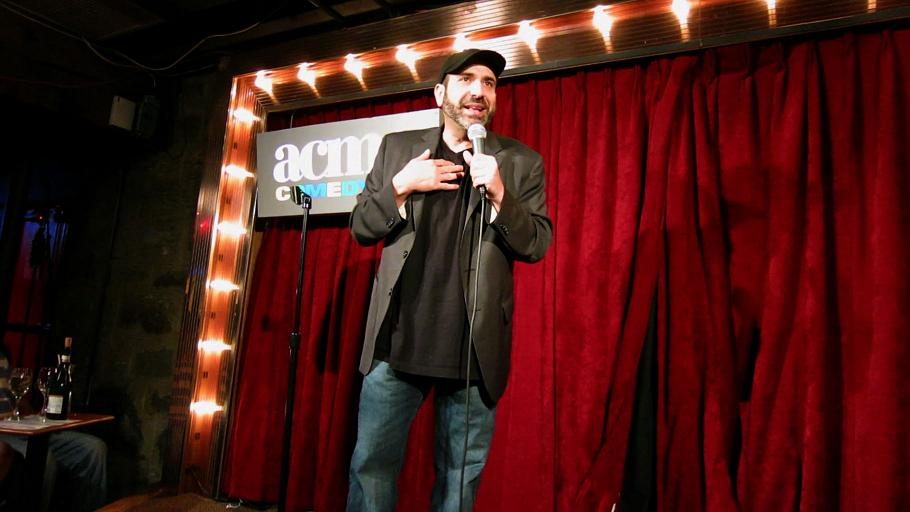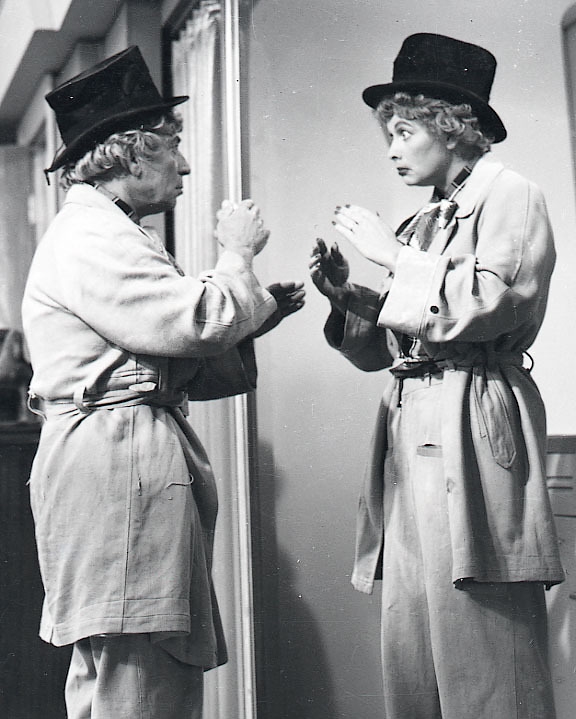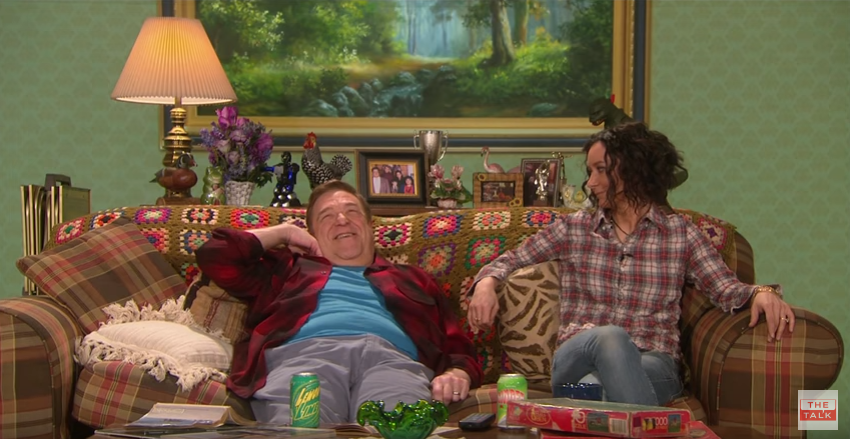Twitter may have given everyone the false hope or impression that they’re all joke machines.
But nobody remains funnier and writes more great jokes and tests them out on a nightly basis in front of living and breathing comedy club customers than Dave Attell. Nobody beats Attell. And Attell wins fairly and squarely, often asking other comedians regularly if any of his new jokes have been told before. A true original. Attell continues to inspire a generation of stand-up comedians, a full decade after he starred on Comedy Central touring the nation’s late-night scenes in Insomniac.
He’s back on the road once more. This time in a new concert film stand-up special, “Road Work,” that debuts at midnight Saturday on Comedy Central. In the hour, Attell performs in five different comedy clubs from New Jersey to Massachusetts to Louisiana, Pennsylvania and Minnesota.
Attell sat down with The Comic’s Comic outside his home club in New York City, The Comedy Cellar, to chat about the experiences of working comedy clubs. And specifically, these five venues seen in “Road Work.” First off, know that Attell’s new special is true to both halves of its title. “We wanted to bounce around from club to club to club, and that became harder than just doing it in one club. Because when it’s just one location, you set everything up, you do it, and then you live with the material you get. But in different clubs, first we had to set up the dates. They were all real dates. And then you get the crews, all the way around, out to these different clubs. So it was more work,” Attell said. “I feel like it really gives it more of a tour aspect. Even though it’s not really – it’s just regular club work, it’s not like a huge tour.”
Attell also said he used local opening acts in each city. “Some of them I knew, some of them I didn’t. But I think it was good for them to be a part of it.”
Here’s an uncensored clip from “Road Work” to check out already!
VINNIE BRAND’s STRESS FACTORY COMEDY CLUB (New Brunswick, N.J.)
“According to Vinnie, I started playing there in the early ‘90s,” Attell said. “I’ve probably been playing there 20 years.”
Not many clubs still have a name attached to it where it’s not only the club owner, but that owner also is a comedian! “The Stress Factory is a great club. The crowds usually that show up range from college kids to adults who, a lot of them have grown up watching me, or seeing me at these clubs. So it’s a cool thing. And most importantly, it’s about an hour away. So it’s great! You go, come back, go again, come back.”
So you don’t get a hotel there? “No. Not anymore. But I played there – Vinnie will tell you this – I’m like the worst omen. Because when I go there, it’s either like. I was there 9/11 week. I was booked there for 9/11 week. I was booked there during like the last couple of storms, there was a monsoon. So he’ll tell you that, ‘Ugh. Attell’s here. It’s gonna be a rough week.’”
“And it’s cool, because Vinnie is also a comic, so he gets it. To give him credit, that club is alive. His whole family works there. He tries to do all these different shows for the new comics. Brings back old names, too, like The Legendary Wid. Like all these crazy names.” The Legendary Wid? “Yeah. He was a prop guy. From Philly. The Legendary Wid. Not The Amazing Johnathan. The Legendary Wid. He was Carrot Top before Carrot Top. That’s what they say. No, he was a prop comic in the vein of Carrot Top.”
HU KE LAU (Chicopee, Mass.)
Is that still booked by (Bill) Blumenreich? “Yes.” When I lived and worked in Boston, I remember the Hu Ke Lau used to be part of a package booking deal where they’d give you that date in Chicopee in the middle of working a weekend at the Comedy Connection in Boston’s Faneuil Hall. Now the Connection is no more, but the Blumenreichs have a larger one-night stand at The Wilbur Theatre. “What they’d try and do was say, ‘We have this date in Boston. And then, on your way home, the next day you can do the Hu Ke Lau.’ And then you can drive out of Western Mass., if you can find 87 or 95, then you can drive back. But the good and bad of that club is, it’s a legendary comedy club in the Boston legendary comedy scene. That every comic that has played Boston played there. It was a big deal. The bad part of it is, for me at least, I draw a drunk crowd. And there’s Chinese food. There’s a lot of stuff going on. But I revel in that. So I’ve had some great battles in that club…When we shot the special, they usually do have a band that plays there during the week. So I said, ‘Let’s bring them in and get them to open.’ And you never want to follow music. Especially Polynesian music. You know, that’s doubly hard. And then the Bruins were in the playoffs. And the crowd was drunk. And I know we didn’t sell out the second show. So it was tough all the way around. You could say it was the left-turn club.”
How often do you play it now? “Maybe once every year, year-and-a-half.”
Do you remember your first time there? “I remember I was scared to death, because like I said, the crowd was drunk, they were angry and they were full of Chinese food. They were ready to go.”
Attell recalls also playing The Kowloon, another in the long line of longtime Massachusetts Chinese restaurants that have played and continue to play host to comedy shows on the weekends Boston and its suburbs. “I had to follow a huge Boston name. And he said, ‘Hey man, I’ve got to get to another gig. Can I just middle? Can I go up quickly?’ He did 40 minutes of all local, super-local material. They were all cheering. Standing-O. Then I went up there. It was one of my first headlining gigs. It was not good. And that whole thing – I think Colin Quinn said it best in that documentary (When Stand-Up Stood Out), ‘If you’re from New York, you really got to earn it, playing the Boston market.’ So that was a hard one.”
ACME COMEDY CO. (Minneapolis, Minn.)
I remember when I lived in Seattle and started getting involved in comedy in the 1990s, all of the working comedians there urged everyone else to book ACME. And it’s still got that reputation today? “I would say ACME has the reputation of probably being one of the smartest crowds in the country. Those people that come there are just good comedy crowds. And they’ve been that way for decades now. And that club, which I hadn’t played in a long time – because the last couple of times I’d been through Minneapolis were theater shows. Like we did one for Mitch Hedberg. It was so good to get back to that club. I didn’t make any money on a lot of these clubs. Like, people go: ‘Oh, well he did the clubs and made a lot of money?’ No. I didn’t make any money. Like One Eyed Jack’s, they were paying me in like guitar picks, and that kind of stuff. ACME also is a small, tight room. So it was funny that we never taped like me getting paid. Like we never filmed the awkwardness of just, thanks! OK! But here’s the money that you get!”
What is it about a place like ACME that can maintain those good crowds? “I think the club owner, who is one of the coolest guys. He totally gets that you have to support the local scene, as well as bring in bigger names. And most of the people who came up through there want to go back, not only because that’s where they’re from, that’s where they started, but also they know that’s a great place to work on material. I was thinking, oh, I wish I could have another day here, so I could relax and enjoy the day.”
HELIUM COMEDY CLUB (Philadelphia, Penn.)
“The funny thing about Helium is that, by the time we shot that, which was near the end of the run. I had finally gotten all of my material together. All the way around, and through, I was still working on it. I had just stopped doing the Dave’s Old Porn DVD edit. Which hopefully will be out later. And then, I was producing this with Scott, who was the director/producer, so we were setting up towns with my managers and agents, and we had to get the pictures to see if they were good backgrounds. I wanted all of the backgrounds to look different. That was my big creative input. If it’s a red one – ACME in Minneapolis has a red background. OK. I don’t want that in the next one. I want something that looks more clubby. And Philly – although the room is not set up well, the crowds are great. They really are great. I think that’s where everything connected. The material and the crowd. I was thinking, Philly’s so good, I should just do Philly. Why? They’re all good. Everything was good. But I would say Philly, that’s the reason we have two segments from Philly – because the majority of the dirty, filthier harder material is later in the show. And that’s where it is.”
How would you compare Helium to Philadelphia comedy clubs you had played when you were younger? “It’s night and day. It’s definitely a 180. Back in the day, you’d play Philly, and all the comics who have come up out of there know that’s a hard, that’s a Fight Club. Very tough. So this new Philly club is wow, great. You get these great crowds and they want to laugh, and it’s in a small, tight room, and it’s just all good.”
ONE EYED JACK’S (New Orleans, La.)
Listening to you this week on WTF with Marc Maron, I guess it hadn’t dawned on me just how long it has been since New Orleans has had a “proper” comedy club. When was the last time a full-time stand-up club operated in New Orleans? “I don’t know. People would do casino gigs. I know Comedy Central has tried to do some specials down there. But back in the day, you’d go there, and it’s funny – because you can find any other type of entertainment there. From washboard playing to gambling, but an actual comedy club where people sit down and listen? No. I don’t think it would work in that town. It’s a party town. Everybody there is drunk and out of control. So comedy never really took hold there. It’s a music town.”
“New Orleans, I’m just going to say this: That One Eyed Jack’s was kind of a like an alt room for a lot of comics. Like, they did some comedy tapings down there, and whatever. But when we rolled in, I was like, ‘Oh, this is too big!’ Because I wanted it to look like a club. But it was probably the most clubby of all of them. It just had this weird just funk of great club. And the crowds there were really good.”
How did you decide to include New Orleans, then? “I just wanted something that was in a different place. Otherwise it was just going to be all East Coast, regional. I needed a Southern place. And I had just played – I had wanted to do The Punchline in Atlanta, but they were working on their background. That’s another really good club for me. That’s another iconic club in the club scene.” Goodnights? “Goodnights, yeah, but they also were in some sort of retooling mode (during filming). But those clubs would have been cool. I wanted it to be small and intimate. But New Orleans would be a wilder crowd. We had been getting good crowds, but we wanted that punch. That pop! We wanted that wild, battle crowd.”
Any other clubs you wanted to shoot at but couldn’t for whatever reason? “One of them was the Portland Helium. We just had a myriad of technical problems. But that was a let’s see if we can do this, if it’ll work in a club. The other one would be Columbus, Ohio, the Funny Bone. That was all good shows. It just, because of what we wanted – different looks – it was starting to look like other stuff. And to be honest, at some point, you just have to decide which were the better shows. I wanted to shoot at the Hermosa, The Comedy & Magic Club. But I really respect Mike. And what he likes. You know, that club is more of a museum, almost a church to comedy. He’s really protective of it. So I didn’t want to get in the way of that.”
Is that also why you didn’t just film it here at the Comedy Cellar?
“I think the Cellar, I hate to say it, is overexposed from Louie and all the other shows that, even though I shot here for the Insomniac show like 20 years ago or something, I still feel like this is the club that everybody knows already.”
Of course, Attell did film all of his companion stand-up showcase series for Comedy Central, Comedy Underground with Dave Attell, at the Village Underground, owned by the same family as the Cellar and located just around the corner on West 3rd Street.
Dave Attell: Road Work, premieres at midnight Saturday, April 12, 2014, on Comedy Central. It’s immediately followed at 1 a.m. Sunday by the debut episode of Comedy Underground with Dave Attell.




One thought on “Dave Attell shares his “Road Work” experiences across America as a club comic in new Comedy Central stand-up special”
Comments are closed.